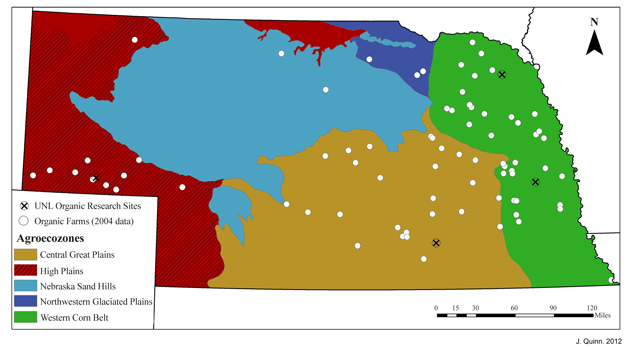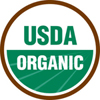G2120
University of Nebraska–Lincoln
Organic Farming Research
An overview of the organic farming research and resources available through University of Nebraska–Lincoln Extension.
Charles A. Shapiro, Soil Scientist
Charles A. Francis, Sustainable Agriculture/Landscape Design Specialist
Elizabeth A. Sarno, Organic Farming Systems Educator
Twyla M. Hansen, Organic Project Assistant
- Organic Farming and Related NebGuides for Nebraska
- Long-term and Current UNL Organic Farming Research
- UNL Organic Information Resources
|
||||
|
The University of Nebraska–Lincoln Institute of Agriculture and Natural Resources is committed to sustainable food, fiber, and natural resource systems that support a bio-based economy, and economics and environments for a sustainable future. To help meet these commitments, four UNL agriculture research centers have established the infrastructure for organic research with field activities funded by grants from the USDA Integrated Organic Program.
Organic crop research is being conducted on USDA National Organic Program (NOP) certified organic land in three of the four Nebraska ecoregions (Western High Plains, Central Great Plains, Nebraska Sandhills, Western Corn Belt) at four agricultural field laboratories across the state on 120 total acres of cropland (Figure 1).
- Southeast: Agricultural Research and Development Center (ARDC) near Mead, Neb., located in the Western Corn Belt Plains (southeast rainfed agroecozone)
- Northeast: Haskell Agricultural Laboratory (HAL) near Concord, Neb., located in the Nebraska Loess Hills (northeast rainfed agroecozone)
- South Central: South Central Agricultural Laboratory (SCAL) near Clay Center, Neb., located in the Central Great Plains (south central irrigated agroecozone)
- West: High Plains Agricultural Laboratory (HPAL) near Sidney, Neb., located in the Western High Plains (western rainfed agroecozone)
 |
| Figure 1. Agroecozones of Nebraska. Certified organic farm operations across Nebraska (2006 data, white dots) and the UNL organic agricultural research sites (⊗) |
Nebraska has diverse ecological and cultural characteristics — average annual rainfall ranging from 13 inches in the west to 36 inches in the east, differing lengths of growing seasons, altitudes, and soils that are valuable for screening cultivars and developing crops for adaptation to organic management under a variety of conditions. Research is conducted on certified organic land, using accepted cultural practices and crop rotations for the varying conditions, which helps provide organic crop production solutions for farmers in their ecoregion.
Long-term and Current UNL Organic Farming Research
Long-term UNL organic research project goals include:
- Provide the organic farming community with research-based solutions to production issues;
- Develop an agroecological research and education system that incorporates a systematic analysis of the ecological impacts of organic production systems;
- Work collaboratively with organic farmers on independent and UNL-driven on-farm field research experiments to determine research priorities, utilize organic farmers; experience, and identify common
organic production solutions;
- Demonstrate and deliver research results to farmers in extension meetings, field days and tours, and through classroom teaching and curriculum information;
- Develop institutional capacity for research, teaching, and extension in organic farming practices and agroecological systems design, and greater cross-disciplinary research integration of components in
the food system;
- Develop a decision support tool, the Healthy Farm Index, to utilize quantitative assessments of biodiversity and ecosystem services to improve farm management;
- Determine the biodiversity, conservation, and ecosystem services value of organic practices;
- Contribute to the efficient management of resources in agroecosystems to benefit farms and net income in all types of systems, and to provide guidelines for more ecologically beneficial systems;
- Provide extension educators with research-based information on transitioning land to organic production, organic farming, cultural practices, crop rotations, and the use of cover crops within crop rotations.
Current UNL organic research includes:
- Nutrient management: Determine the effects of organic soil amendments, and interaction between general fertility levels and integrated weed control; assess nutrient balance on organic farms; raise
knowledge in organic community of exported nutrients;
- Weed management: Evaluate an integrated approach for weed control using mechanical methods and flame weeding;
- Cover crops: Determine optimum selection of mixture, timing of planting, economics, incorporation methods, effects on crop yields, benefits to increase soil nutrient levels, organic matter, carbon,
water-holding capacity, erosion prevention and microbial activity, increase species biodiversity, habitat for beneficial insects, and weed suppression;
- Organic small grains breeding and systems development: Breed cultivars optimal to organic production for disease and pest resistance, response to fertilizers, and end-use quality;
- Antioxidant production in organic small grains: Determine levels of antioxidant levels among wheat cultivars, and organic environments;
- Biodiversity conservation on working organic farms: Quantify the effect of organic management of breeding bird populations, and institute long-term ecological monitoring;
- Healthy Farm Index assessment of biodiversity indicators and land use patterns: Deliver a tool to organic farmers for farm assessment and structured decision making;
- On-farm/farmer research capability: Provide guidance, encouragement, and technical support for organic farmers and research groups in Nebraska.
On-going UNL research impacts organic education in Nebraska through:
- resident instruction, especially undergraduate education;
- extension outreach;
- information resources provided to other public agencies, colleges, high school educators, and others in Nebraska.
UNL Organic Information Resources
Education. Resident education at UNL includes specific units and materials in courses such as:
- Organic Farming and Horticulture (AGRO/HORT 439/839)
- Agroecology (AGRO/HORT/NRES 435/835)
- Agroecosystems Analysis (AGRO/HORT 436/836)
- Agricultural and Natural Resources Systems (NRES/AGRI 103)
- Agroforestry in Sustainable Agricultural Systems (NRES/HORT 417/817)
- Introduction to Conservation Biology (NRES 211)
An organic option is now available for students majoring in Agronomy and Horticulture.
Extension outreach. Extension outreach is available to organic, sustainable, conventional and transitioning farmers, agronomists, farm technicians, advisors, consultants, inspectors and suppliers, teachers, students, government officials, consumers, and the general public. Specific activities include field days at the UNL organic research sites and on local organic farms, organic educational seminars, workshops, and conference presentations across the state. Informational materials, mentoring, discussions, and learning from organic farmers are emphasized at all venues. On-farm organic research is currently taking place on organic farms across the state.
Web resources. The Organic Working Group website (organic.unl.edu) is linked to UNL CropWatch (cropwatch.unl.edu), allowing results to reach a broad audience. The Organic Working Group website includes a section for farmer feedback and research suggestions, links to past and current organic research, and links to organic research publications.
Other Web resources include:
- Organic Farming 2010 (sustainableag.unl.edu/pdf/OrganicFarming2010.pdf)
- Multifunctional Rural Landscapes and the Importance of Ecosystem Services in Farmland (sustainableag.unl.edu/research.shtml)
In addition, the Organic Working Group can be found on:
- Twitter (twitter.com/UNL_Organic)
- Facebook (www.facebook.com/pages/Lincoln-NE/UNL-Organic-Working-Group/79073982154)
For more information:
Elizabeth Sarno, Extension Educator
UNL Organic Project Coordinator
Email: esarno2@unl.edu
Phone: 402-584-2261
This publication has been peer reviewed.
Visit the University of Nebraska–Lincoln Extension Publications website for more publications.
Index: Crop Production/Field Crops
Cropping Practices
Issued June 2012
